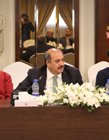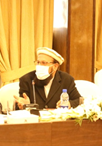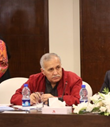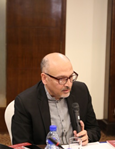PIPS Consultation-2 on Afghan Peace & Reconciliation
Pak Institute for Peace Studies held an experts’ consultation on December 11, 2021, titled “Supporting the Afghan peace process: Pakistan’s position, interests, and policy options” in Islamabad. Participants noted that Pakistan needs a functional, collaborative strategy in the framework of regional approach to deal with the Afghan situation. While it was suggested that humanitarian assistance is the need of the hour, it was also emphasized that Pakistan should help Kabul in institutional development and addressing the governance deficit. Some participants underscored that the great game continues in Afghanistan making policy choices for Pakistan even more difficult. Hence, demonstrating a regional approach, Pakistan must act within the next three months and engage the Taliban to convince them to form an inclusive government in Afghanistan in order to avert the anticipated civil war. The participants of the consultation included academicians, ex-ambassadors, former military officers, senior journalists, and office bearers of different religious-political parties besides others.
Maulana Abdul Qadir Luni, head of Jamiat Ulema-i-Islam-Nazriyati (JUI-N) opening the debate stressed that p eace as well as instability in Afghanistan directly impact Pakistan. According to him, a peaceful Afghanistan under the Taliban rule is good news for Pakistan and the world who have been desiring for it for long.
eace as well as instability in Afghanistan directly impact Pakistan. According to him, a peaceful Afghanistan under the Taliban rule is good news for Pakistan and the world who have been desiring for it for long.
 Pakistan’s former National Security Advisor Lt. General (retd) Nasser Khan Janjua was of the view that the solution to Afghan quandary lied within the region and Pakistan should play its role in coordination with other regional countries to help Afghanistan besides sending food assistance to it.”. He also highlighted the dillema Pakistan is facing due to Afghan situation and noted that “the world gets antagonized whenever Pakistan extends help to the neighbouring country.”
Pakistan’s former National Security Advisor Lt. General (retd) Nasser Khan Janjua was of the view that the solution to Afghan quandary lied within the region and Pakistan should play its role in coordination with other regional countries to help Afghanistan besides sending food assistance to it.”. He also highlighted the dillema Pakistan is facing due to Afghan situation and noted that “the world gets antagonized whenever Pakistan extends help to the neighbouring country.”
 Dr. Human Baqai, an associate professor of social sciences at Institute of Business Administration, Karachi, said that “the issue of recognition and legitimacy of the Taliban government is more important than providing it food assistance.” According to her, since Afghanistan is without a constitutional framework, the major issue it is facing and will continue to face is of functional sustainability and Pakistan should help in that regard. Moreover, she noted, the U.S. is highly aggrieved as they believe that Pakistan is to be held responsible for every resurgence that has taken place at the part of the Taliban. So, Pakistan should not let go of balance, and should avoid camp politics, she asserted.
Dr. Human Baqai, an associate professor of social sciences at Institute of Business Administration, Karachi, said that “the issue of recognition and legitimacy of the Taliban government is more important than providing it food assistance.” According to her, since Afghanistan is without a constitutional framework, the major issue it is facing and will continue to face is of functional sustainability and Pakistan should help in that regard. Moreover, she noted, the U.S. is highly aggrieved as they believe that Pakistan is to be held responsible for every resurgence that has taken place at the part of the Taliban. So, Pakistan should not let go of balance, and should avoid camp politics, she asserted.
 Chairman Council of Islamic Ideology Dr Qibla Ayaz stressed that Pakistan should engage the Taliban through those local religious scholars and ulema who have great influence over them to convince them that the world wanted “inclusive and true representative government” in Afghanistan. He suggested said that Taliban should address issue of giving women their rights to education and employment. He also said that Afghan cell in Foreign Office should be expanded and more experts on Afghanistan should be involved.
Chairman Council of Islamic Ideology Dr Qibla Ayaz stressed that Pakistan should engage the Taliban through those local religious scholars and ulema who have great influence over them to convince them that the world wanted “inclusive and true representative government” in Afghanistan. He suggested said that Taliban should address issue of giving women their rights to education and employment. He also said that Afghan cell in Foreign Office should be expanded and more experts on Afghanistan should be involved.
 Dr. Zafar Nawaz Jaspal, professor of Politics and International Relations in QAU foresaw half-hearted responses to come out of Organisation of Islamic Cooperation’s meeting scheduled to take place in Islamabad this month. He said that Saudi Arabia and other Arab countries will give aid to the war-torn Afghanistan on their own terms and conditions. He also insisted that any aid coming through OIC might actually further fan the flames of sectarianism in Afghanistan. He also said that Pakistan’s policy of appeasement towards warring groups would not be successful and its on-going talks with the banned Tehreek-e-Taliban (TTP) could result in reinforcing other militant groups.
Dr. Zafar Nawaz Jaspal, professor of Politics and International Relations in QAU foresaw half-hearted responses to come out of Organisation of Islamic Cooperation’s meeting scheduled to take place in Islamabad this month. He said that Saudi Arabia and other Arab countries will give aid to the war-torn Afghanistan on their own terms and conditions. He also insisted that any aid coming through OIC might actually further fan the flames of sectarianism in Afghanistan. He also said that Pakistan’s policy of appeasement towards warring groups would not be successful and its on-going talks with the banned Tehreek-e-Taliban (TTP) could result in reinforcing other militant groups.
 Maulana Yousaf Shah, president Jamiat Ulema-e-Islam- Sami (JUI-S), Khyber Pakhtunkhwa, talking about government’s on-going talks with the TTP hoped that there would be positive outcome of these negotiations as some “powerful players are involved in the process this time.”
Maulana Yousaf Shah, president Jamiat Ulema-e-Islam- Sami (JUI-S), Khyber Pakhtunkhwa, talking about government’s on-going talks with the TTP hoped that there would be positive outcome of these negotiations as some “powerful players are involved in the process this time.”
 Former Senator Afrasiab Khattak viewed that Pakistan needed to change it strategy towards Kabul and form a new Afghan policy on bilateral basis. He said that next three months were very important for Afghanistan to handle the situation, otherwise there is likelihood of beginning of a civil war there in April next year. “This war would have the potential to convert into a proxy war.” He also argued that many global and regional countries have been trying to protect their vested interests through close-door relations with the Taliban, since long before they came into power. He underscored the role Pakistan could still play in bringing all the groups in Afghanistan on the table to make an “inclusive and representative
Former Senator Afrasiab Khattak viewed that Pakistan needed to change it strategy towards Kabul and form a new Afghan policy on bilateral basis. He said that next three months were very important for Afghanistan to handle the situation, otherwise there is likelihood of beginning of a civil war there in April next year. “This war would have the potential to convert into a proxy war.” He also argued that many global and regional countries have been trying to protect their vested interests through close-door relations with the Taliban, since long before they came into power. He underscored the role Pakistan could still play in bringing all the groups in Afghanistan on the table to make an “inclusive and representative
 Pakistan’s former ambassador to Iran, Asif Ali Durrani recommended that in the wake of the ongoing situation Pakistan must formulate a regional policy to deal with the Afghan issue. He also underlined that even under the U.S. control, a socio-economic structure did not exist in Afghanistan, so Americans failed to inject the democracy they intended to inject in Afghanistan. According to him, democracy is an intrinsic process; western model of democracy transferred to Afghanistan did not align with its cultural values, thereby it was bound to fail. Furthermore, he emphasized that the Taliban must give education and employment rights to women.
Pakistan’s former ambassador to Iran, Asif Ali Durrani recommended that in the wake of the ongoing situation Pakistan must formulate a regional policy to deal with the Afghan issue. He also underlined that even under the U.S. control, a socio-economic structure did not exist in Afghanistan, so Americans failed to inject the democracy they intended to inject in Afghanistan. According to him, democracy is an intrinsic process; western model of democracy transferred to Afghanistan did not align with its cultural values, thereby it was bound to fail. Furthermore, he emphasized that the Taliban must give education and employment rights to women.
 Senior journalist, Shahzada Zulfiqar predicted an increase in cross-border movement amidst ongoing humanitarian crisis and soaring poverty in Afghanistan. He also added that even though the Taliban have taken control of Kabul, the group itself is also wary of its fledgling government structure. Furthermore, he indicated that the economic plight of neighbouring Afghanistan will have a spillover effect on Pakistan.
Senior journalist, Shahzada Zulfiqar predicted an increase in cross-border movement amidst ongoing humanitarian crisis and soaring poverty in Afghanistan. He also added that even though the Taliban have taken control of Kabul, the group itself is also wary of its fledgling government structure. Furthermore, he indicated that the economic plight of neighbouring Afghanistan will have a spillover effect on Pakistan.
 Sami Yousafzai, an expert on Afghan Affairs asserted that there is nothing in the name of the government in Afghanistan. He suggested that amidst the humanitarian crisis the future seems bleak for Afghanistan, and the world is reluctant to recognize the Taliban regime for multiple reasons including to avoid sending an emboldening message to Islamist militant groups across the world. According to him, while uncertainty prevails, Pakistan must focus on increasing people to people contact in order to contest the world’s opinion that Pakistan is the mouthpiece of the Taliban.
Sami Yousafzai, an expert on Afghan Affairs asserted that there is nothing in the name of the government in Afghanistan. He suggested that amidst the humanitarian crisis the future seems bleak for Afghanistan, and the world is reluctant to recognize the Taliban regime for multiple reasons including to avoid sending an emboldening message to Islamist militant groups across the world. According to him, while uncertainty prevails, Pakistan must focus on increasing people to people contact in order to contest the world’s opinion that Pakistan is the mouthpiece of the Taliban.
 Haroon Rashid, Managing Editor of Independent Urdu pointed out the ambiguity in Pakistan’s policy towards Tehreek-e-Taliban Pakistan claiming that the negotiation process might be under pressure from the Afghan Taliban as reflected in our silent response to TTP’s refusal to extend the ceasefire. He also pointed out that the Taliban are worried about the humanitarian and economic crisis in Afghanistan, so ceasefire is least of their concern.
Haroon Rashid, Managing Editor of Independent Urdu pointed out the ambiguity in Pakistan’s policy towards Tehreek-e-Taliban Pakistan claiming that the negotiation process might be under pressure from the Afghan Taliban as reflected in our silent response to TTP’s refusal to extend the ceasefire. He also pointed out that the Taliban are worried about the humanitarian and economic crisis in Afghanistan, so ceasefire is least of their concern.
Dr. Fizza Batool, Research Associate at PIPS, warned of a possible rise of religious extremism in Pakistan as the government’s policy of advocating the Taliban and justifying their actions would eventually encourage groups who wants to establish Taliban-like regime in Kabul. She questioned the abrupt shift in government’s narrative towards TTP, asking how a group considered an Indian proxy just a year back is offered amnesty without consultation to the parliament.
Imran Mukhtar, senior correspondent at The Nations, commented on the Pak-Afghan border mismanagement in last a few months, explaining that the managerial responsibility has recently been shifted to the Ministry of Interior which lacks both ability and resources. Consequently, Aghan nationals have to face many difficulties while getting immigration to enter into Pakistan. He also confirmed that the border fencing has reduced but not ended cross-border smuggling and drugs and arms trafficking as livelihood of many depends on this illegal business.
In the beginning, Director PIPS Muhammad Amir Rana in his welcome remarks provided the rationale and objective behind conducting such consultations and underlined the need to discuss how current regime in Kabul would function, how to deal with evolving humanitarian crisis in Afghanistan, and what can be the response of Pakistan and how can it contribute?

